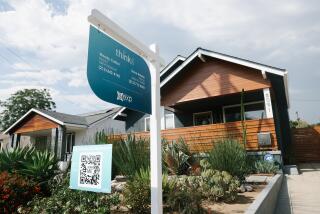$10-billion settlement of foreclosure abuse cases said to be near
- Share via
Banks and regulators worked late Sunday to finalize a nearly $10-billion settlement that would halt a much-maligned program to review foreclosures from the height of the housing crisis, according to four people familiar with the talks.
At least 14 banks are involved. Since the reviews began in late 2011, the banks have paid $1.5 billion to consultants examining foreclosure records -- but not a penny to aggrieved borrowers. Both bankers and regulators found that result untenable, officials have said.
The new agreement could be announced as early as Monday morning by the Office of the Comptroller of the Currency, the arm of the Treasury Department that regulates banks with national charters, four people familiar with the negotiations said.
The people spoke on condition of anonymity because the discussions were sensitive and incomplete. The principal negotiators included six big banks that provide customer service on 90% of all U.S. home loans: Bank of America Corp., Wells Fargo & Co., JPMorgan Chase & Co., Citigroup Inc., U.S. Bancorp and PNC Financial Services.
Regulators were presenting the deal late Sunday to eight smaller mortgage servicers that had agreed to the reviews in 2011 but were less involved in the settlement negotiations.
The regulators were prepared to announce a settlement even if some of the smaller banks declined to accept it, three of the people with knowledge of the talks said, in part because of pressure from bankers wanting to report a settlement when they announced fourth-quarter financial results.
Other efforts to help troubled borrowers and address foreclosure abuses include a $26-billion settlement last February among five giant banks and a coalition of federal agencies and state attorneys general.
The reviews of individual cases were distinctive, however, because they represented a chance to gauge the extent of the legal shortcuts, lost paperwork and abusive fees that had prompted widespread complaints.
Consumer advocates fretted that abandoning that process could mean there would be no such definitive accounting of the foreclosure mess. And they called for detailed disclosure of how the consultants had conducted reviews and how the nearly $10 billion would be spent.
“Unlike the AG settlement, which had a huge amount of scrutiny, there’s been a real lack of transparency in the foreclosure reviews and this settlement,” said Paul Leonard, California director of the Center for Responsible Lending.
The proposed settlement includes $3.75 billion in cash payments to borrowers eligible for reviews, two people familiar with the proposed agreement said.
Under the original plan devised by the comptroller and the Federal Reserve in April 2011, 4.4 million Americans whose homes were in foreclosure proceedings in 2009 and 2010 could request a free review. Only about half a million have done so.
Borrowers who never requested a review would get only a few hundred dollars under the proposed settlement. Those who requested reviews would get bigger payments. And those determined to have definitely or likely suffered harm from flawed foreclosures could be in line for much larger payments.
Another $6 billion in “soft” aid would assist delinquent borrowers, mainly through loan modifications, relocation assistance and short sales, in which homeowners are allowed sell their home for less than they owe on their mortgage. Some, but not all, of those borrowers are among those who had been eligible for the foreclosure reviews.
Payments will be allocated according to the share of the homes in foreclosure in 2009 and 2010. That would mean Bank of America, which at the time was the biggest servicer of the loans, would pay the most.
After the initial agreement was reached with the 14 banks accused of improper foreclosures, the Federal Reserve filed enforcement actions accusing the giant Wall Street investment banks Goldman Sachs and Morgan Stanley of similar abuses. Those cases are pending and it couldn’t be determined if those banks would sign on to a similar settlement.
More to Read
Inside the business of entertainment
The Wide Shot brings you news, analysis and insights on everything from streaming wars to production — and what it all means for the future.
You may occasionally receive promotional content from the Los Angeles Times.











